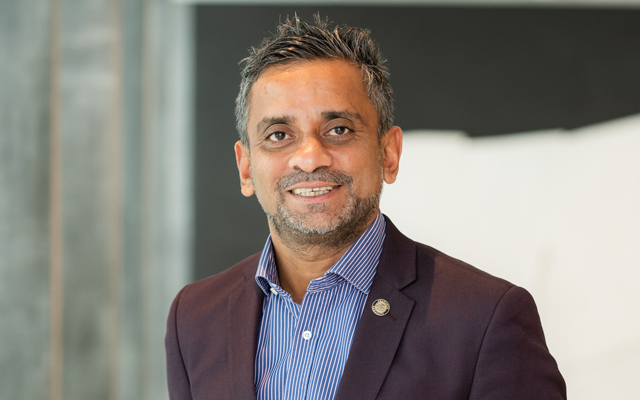Pat Patel, executive director, Elevandi, shares how the annual Singapore FinTech Festival (SFF) – now in its eighth edition – has transformed, and grown in size and stature over the years

How has SFF evolved since inception in 2016 and how did Elevandi come about?
Since its inception in 2016, the Singapore FinTech Festival (SFF) has emerged as a giant on the world stage, solidifying its reputation as one of the largest and most influential FinTech events. Over the years, it has not only grown in size but also in reach and impact.
Inaugurated by the Monetary Authority of Singapore (MAS) in partnership with The Association of Banks in Singapore, the first iteration of SFF in November 2016 was a first-of-its-kind event in Asia. Created for and supported by the industry, it drew some 12,000-plus participants.
SFF came into its own during the Covid-19 pandemic when it went hybrid, and in the process, became global. In collaboration with Singapore Week of Innovation and TeCHnology (SWITCH) organised by Enterprise Singapore, aside from in-person sessions in Singapore, 45 satellite events were hosted by partner cities across the world from December 7-11, 2020.
SFF was conceived with the mission to elevate policy discourse and decision-making within the FinTech arena. MAS set up Elevandi (elevate or lift in Latin) as a separate entity in 2021 to help build a global knowledge and collaboration platform.
The 2022 edition hosted more than 62,000 individuals from over 150 countries and 12,000 attending organisations. This diverse gathering included industry titans, policy influencers, and ground-breaking innovators, attesting to SFF’s status as a global powerhouse in the FinTech landscape.
SFF 2023’s (November 15-17, 2023) line-up of distinguished speakers and high-level political participation is a value-added dimension as we elevate the discourse and sharpen SFF’s global relevance.
The festival’s agenda has also evolved organically to encompass an ever-widening array of topics at the intersection of policy, technology, and finance. This diversification mirrors the dynamism of the FinTech sector itself, and SFF has embraced the challenge of keeping pace with the industry’s rapid evolution.
What does it take to distinguish SFF from somewhat similar events, such as Hong Kong FinTech Week?
What sets SFF apart is its ascent from a regional phenomenon to a global one. Aside from the IMF Spring Meetings, no other event has managed to gather the likes of the IMF managing director and World Bank president – as well as heads of state, prime ministers, and top dignitaries – in one place.
In 2023, collaboration continues with partners across Africa, Europe and North Asia. This expansion of jurisdictional partnerships signifies SFF’s commitment to fostering international connections and promoting FinTech on a global scale.
This sets us apart from regionally-focused gatherings; transcending geographical boundaries makes SFF a truly international affair. It is a dynamic platform for the exchange of ideas, forging partnerships and exploring cutting-edge innovations in finance and technology. SFF’s significance lies not only in its capacity to drive meaningful discussions but also its ability to catalyse the growth of the global FinTech ecosystem.
How does Elevendi ensure SFF stays creative and relevant to sponsors, exhibitors, speakers and delegates to secure their continued participation?
The Elevandi team has grown both in size and in our drive to innovate each year. A large part of our success is derived from focusing on issues that are at the forefront of current industry and public discourse – particularly at the intersection of policy, finance, and technology.
Hence, SFF adopts a different major theme each year. In 2021, SFF became the first large-scale global platform outside of the Web3-native space that facilitated meaningful conversations about the emerging Web3 industry among regulators, institutional players and key leaders from traditional finance sectors.
AI will take centrestage at this year’s SFF, under the overall theme of “Applications of Artificial Intelligence” and strategic sub-theme, “AI for good, or AI for good?” By framing a question, we hope to stimulate meaningful debate that cuts through the AI buzz, focusing on AI’s potential to be a force for good and what it will take to achieve this.
SFF 2023 has specially curated zones dedicated to Founders, Technology, ESG, Regulation and Talent to make it easier for attendees to navigate the conference and drive various business objectives.
Furthermore, we are piloting “The Big Spark”, an up-and-coming reality show on CNA (Channel News Asia) spotlighting South-east Asia’s entrepreneurial talent and their innovative business ideas. Given CNA’s prominence, this takes SFF’s reach into the millions, inspiring a new wave of entrepreneurs in the process.
To date, SFF’s seven editions have brought together over 330,000 attendees from 150 countries – and the event continues to grow. Our strategy of keeping our ears close to the ground has been working, and we are committed to maintaining this momentum for years to come.
Where do you see SFF in the next five years, perhaps expansion/offshoots in other countries?
It is our hope that within the next five years, we’ll see each SFF surpass 100,000 attendees. As SFF’s impact as a platform extends beyond the three-day conference, we are constantly exploring creative ways to harness this influence, facilitating exponential growth in our reach, particularly in the digital realm.
Moreover, despite increasing global attendance over the years, being hosted in Singapore means SFF’s immediate demographic, by geographic proximity, is still strategically focused on South-east Asia and the wider Asia Pacific region.
As such, some smaller-scale programmes will be hosted in other key markets, including two in Japan, two in Africa, and one in Europe in the coming months. These offshoots will help build SFF’s visibility and reputation as a leading FinTech champion across multiple continents.





















